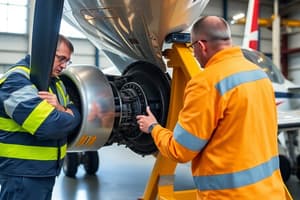Podcast
Questions and Answers
What is a significant cause of maintenance errors?
What is a significant cause of maintenance errors?
- Overestimation of abilities
- Strict adherence to procedures
- Lack of knowledge (correct)
- Use of advanced technology
Which aspect is critical to ensuring safety and efficiency in maintenance activities?
Which aspect is critical to ensuring safety and efficiency in maintenance activities?
- Automated systems usage
- Human factors education (correct)
- Formal education in engineering
- Documentation quality
What role do workplace and environmental factors play in maintenance?
What role do workplace and environmental factors play in maintenance?
- They are secondary considerations.
- They can influence human performance and errors. (correct)
- They ensure compliance with regulations.
- They primarily enhance productivity metrics.
Why is communication important among maintenance personnel?
Why is communication important among maintenance personnel?
Which factor is NOT essential in creating a strong safety culture?
Which factor is NOT essential in creating a strong safety culture?
What should effective training programs for maintenance personnel include?
What should effective training programs for maintenance personnel include?
How can human factors be applied to documentation in maintenance?
How can human factors be applied to documentation in maintenance?
What is an example of a workplace factor that can lead to human error?
What is an example of a workplace factor that can lead to human error?
Which factor is NOT typically classified as a human factor affecting work performance?
Which factor is NOT typically classified as a human factor affecting work performance?
What is the primary focus of anthropometrics in relation to human factors?
What is the primary focus of anthropometrics in relation to human factors?
Which area of psychology focuses on how organizations manage work groups?
Which area of psychology focuses on how organizations manage work groups?
Which of the following best describes the role of safety engineering?
Which of the following best describes the role of safety engineering?
What aspect of cognitive science is critical for the design of equipment and software?
What aspect of cognitive science is critical for the design of equipment and software?
Which type of psychology examines how individuals learn and retain information?
Which type of psychology examines how individuals learn and retain information?
What human factor can significantly contribute to workplace accidents due to environmental conditions?
What human factor can significantly contribute to workplace accidents due to environmental conditions?
Which area of study emphasizes the design of tasks for efficient human performance?
Which area of study emphasizes the design of tasks for efficient human performance?
In the context of incident reporting, which of the following is important for reducing errors?
In the context of incident reporting, which of the following is important for reducing errors?
Which factor does NOT typically affect cognitive processing in stressful situations?
Which factor does NOT typically affect cognitive processing in stressful situations?
Flashcards
Human Factors in Maintenance
Human Factors in Maintenance
Applying knowledge of human performance, behavior, and limitations to improve safety, efficiency, and maintenance effectiveness.
Maintenance Errors
Maintenance Errors
Mistakes in maintenance tasks often stemming from human limitations or issues like poor communication, complacency, or fatigue.
Situational Awareness
Situational Awareness
Understanding the current situation during a maintenance task, including surroundings, equipment status, and potential hazards.
Fatigue Management
Fatigue Management
Signup and view all the flashcards
Workplace Design
Workplace Design
Signup and view all the flashcards
Training for Maintenance Personnel
Training for Maintenance Personnel
Signup and view all the flashcards
Communication in Maintenance
Communication in Maintenance
Signup and view all the flashcards
Safety Culture in Maintenance
Safety Culture in Maintenance
Signup and view all the flashcards
Human Factors
Human Factors
Signup and view all the flashcards
Anthropometrics
Anthropometrics
Signup and view all the flashcards
Cognitive Science in Human Factors
Cognitive Science in Human Factors
Signup and view all the flashcards
Safety Engineering
Safety Engineering
Signup and view all the flashcards
Medical Science in Human Factors
Medical Science in Human Factors
Signup and view all the flashcards
Organizational Psychology in Human Factors
Organizational Psychology in Human Factors
Signup and view all the flashcards
Educational Psychology in Human Factors
Educational Psychology in Human Factors
Signup and view all the flashcards
Industrial Engineering
Industrial Engineering
Signup and view all the flashcards
Effects of Stress on Human Performance
Effects of Stress on Human Performance
Signup and view all the flashcards
Importance of Incident Reporting
Importance of Incident Reporting
Signup and view all the flashcards
Study Notes
Human Factors in Maintenance
- Human factors in maintenance optimize safety, efficiency, and effectiveness by applying knowledge of human performance, behavior, and limitations.
- Maintenance errors often stem from human factors like miscommunication, complacency, lack of knowledge, distraction, fatigue, lack of teamwork, and stress.
Key Aspects of Human Factors in Maintenance
- Human Performance and Behavior: Understanding how human capabilities and limitations interact with systems, procedures, and equipment is crucial. Factors include situational awareness, decision-making, communication, fatigue management, and teamwork.
- Error Prevention: Identifying factors that cause mistakes (e.g., communication breakdowns, lack of knowledge, distractions, fatigue) and implementing solutions to prevent future errors are paramount.
- Workplace and Environmental Factors: The work environment plays a big role. Optimal conditions include good lighting, reduced noise, adequate resources, and ergonomic designs to prevent overloading and human error.
- Training and Competence: Effective training, especially in human factors, is vital. This ensures maintenance staff possesses the necessary skills and knowledge for safe operations.
- Communication and Teamwork: Clear communication within and across departments among maintenance personnel is crucial. Teamwork promotes knowledge sharing, safety, and efficiency.
- Safety Culture: Encouraging a safety-first mindset is important. This includes proactive measures such as fatigue risk management, regular health checks, and adequate rest periods.
- Documentation and Procedures: Human factors principles should guide design of maintenance documentation, work orders, inspection reports, checklists, making them accessible and usable for staff.
- Incident Reporting and Learning: Effective incident reporting coupled with comprehensive analysis identifies contributing human factors and enables corrective actions to prevent recurrences.
Factors Affecting Work Performance
- Numerous factors affect workforce performance. Examples include fatigue, poor communication, personal problems, environmental factors (e.g., fumes, noise), slippery floors, incomplete documentation, poor instructions, substance abuse, poor training, inadequate resources, boring repetitive tasks, unrealistic deadlines.
- Often, multiple factors contribute to a problem.
Disciplines Contributing to Human Factors
- Clinical Psychology: Focuses on psychological well-being, addressing emotions, motivation, fears, personality, stress coping mechanisms, self-image, and acceptance of feedback.
- Anthropometrics: Studies human body dimensions (size, strength, reach) to ensure equipment and tasks are ergonomically designed to fit users' capabilities, using principles from design, like that of a Coca-Cola bottle being shaped to comfortably fit the hand.
- Experimental Psychology: Observes workers' behavior in the workplace, using statistical analysis to understand work processes and effects of factors like stress. This allows identifying performance patterns and causes of issues like unsafe behaviors, lack of concentration, and time management complications.
- Computer Science: Examines human-computer interaction, user interface design, software design, and computer literacy accommodation to ensure usability.
- Cognitive Science: Studies thought processes, problem-solving abilities, and information processing to improve equipment and documentation designs. Improving employee thinking patterns boosts troubleshooting performance and minimizes stress impact on processing.
- Safety Engineering: Focuses on worker safety aspects, encompassing safety equipment, labeling, rules, and facility design. This includes mitigating risks related to slips, trips, falls, material handling, toxic materials, etc.
- Medical Science: Addresses vision, hearing, balance, and health in the workplace. This encompasses biomechanics, physical structure of perceptual elements, work physiology, and fatigue effects to establish workplace conditions promoting worker safety and health.
- Organizational Psychology: Examines how people behave within groups, including organizational structures, rewards, motivation, teamwork dynamics, and relationships between unions and management. This promotes workplace collaboration and positive interactions.
- Educational Psychology: Studies learning principles and how to help people retain information, employing these principles in training program design to enhance knowledge retention and operational procedures adherence. A key concept is optimizing the learning experience for better job performance and employee safety.
- Industrial Engineering: Takes a systematic approach to understand and optimize workplace efficiency. This includes setting work standards, designing efficient work tasks, using statistical analysis, and facility layout.
Studying That Suits You
Use AI to generate personalized quizzes and flashcards to suit your learning preferences.




